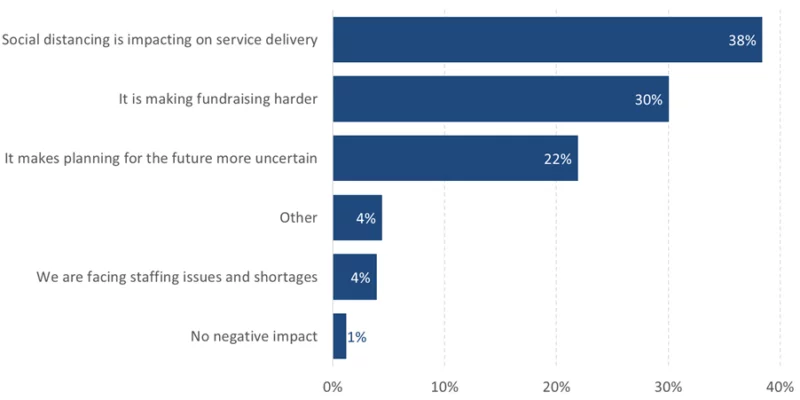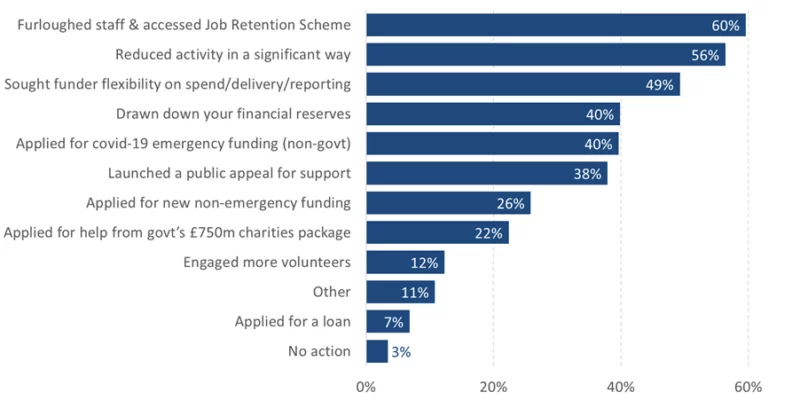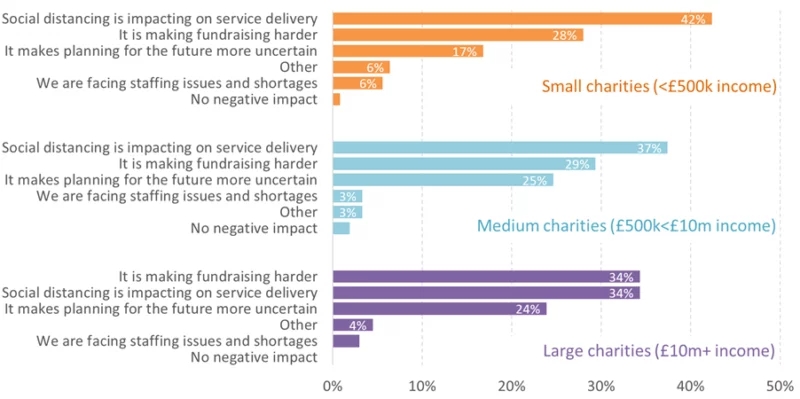Social distancing’s impact on service delivery is charities’ biggest challenge says research
Nine-in-ten charities say the pandemic has negatively affected their ability to fulfil their objectives, with Covid-19’s impact on service delivery and fundraising their biggest challenges, according to Pro Bono Economics’ weekly survey, which monitors the impact of the pandemic on charities and voluntary organisations across the UK.
406 charities completed Pro Bono Economic’s survey over the 12 and 13 of May. These were split between 125 small charities (annual income of less than £500,000), 211 medium sized charities (£500,000 and £10 million), 67 large charities (£10 million or more), and three ‘others’.
Charities stated their biggest challenges were:
- The impact of social distancing on their ability to deliver their services (38% of respondents)
- The way in which Covid-19 has affected their ability to fundraise (30%)
- Its effect on their ability to plan ahead (22%)
Nearly all (97%) of charities say they have taken some form of action in response to the financial challenges raised by the crisis. The most cited response was the furloughing of staff and use of the government’s Job Retention Scheme, with 60% of respondents saying they’ve done this. 56% have reduced their activity in a significant way, while half (49%) say they have sought funder flexibility on their spending plans, project delivery and reporting requirements.
40% say that they have drawn down on their financial reserves, while 22% have applied for support from the government’s £750 million charity-specific package.
Asked to rate the sufficiency of the government’s financial support for civil society in the face of Covid-19 (1 = entirely insufficient and 10 = entirely sufficient), 68% scored the response at five or below, with 41% scoring it 1-3 and 10% scoring it 8-10.
Three-in-four (74%) charities say it was unlikely that the financial challenge associated with Covid-19 will cause their organisation to stop operating altogether in six months’ time. However, 10% said it was likely that they would cease operating, with 3% saying it was very likely.
Small charities were most likely to say that social distancing had the biggest impact on their ability to deliver services at 42%, followed by medium sized charities (37%) and then large charities (34%). However, the order reverses in relation to the effect of Covid-19 on fundraising, with 34% of large charities citing it as the single biggest issue, followed by 29% of medium sized charities and 28% of small charities.
The most frequently mentioned response to the crisis among smaller charities was having reduced activity in a significant way (61%), followed by applying for non-government emergency funding (47%) and seeking funder flexibility (42%). 38% said they have furloughed staff, compared to 75% of large charities say that they have furloughed staff, while 54% of large charities say they have reduced activity in a significant way.
Matt Whittaker, Chief Executive of Pro Bono Economics, commented:
“Seven weeks into the Covid-19 lockdown there is little sign of any easing of the pressures being faced in the social sector.
“The good news is that three-in-four say they think it is unlikely that the crisis will force them to stop operating within the next six months. Nevertheless, a sizeable minority of one-in-ten think they will cease to exist. That’s significantly lower than figures reported in other sector surveys, but it would still represent a big loss to social and economic wellbeing in the UK.
“It is important too to note that the proportion thinking they will go out of business rises to 15% among smaller charities. Organisations in this group appear less able than larger charities to access financial support from the government and others. They also appear to have less financial wiggle room: 31% have drawn down on their financial reserves, compared with 43% of large charities. In the absence of such sources of resilience, the primary response of smaller organisations has instead been to cut back on their activity.”Advertisement






